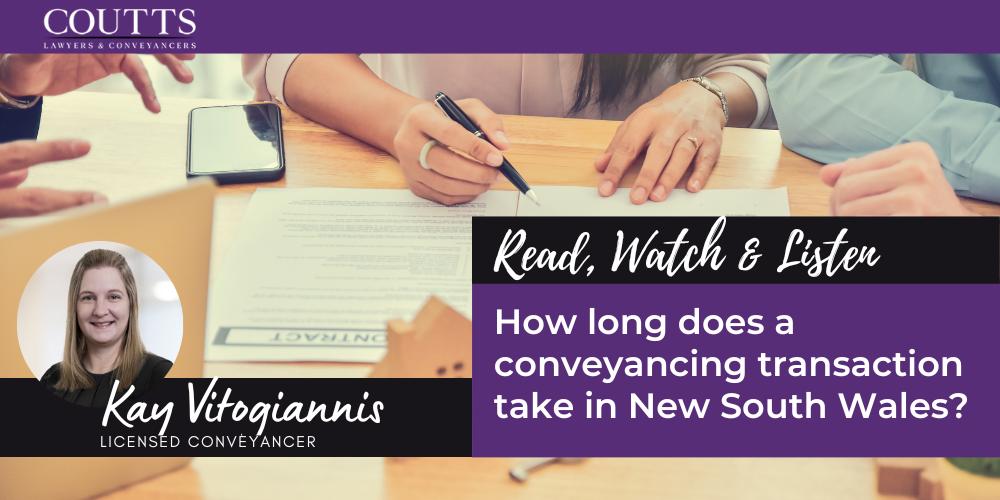KEY TAKE-OUTS
- Standard Contract for Sale completion period is 42 days, however this can be changed by agreement between the parties
- Generally, the vendor needs to complete and submit a Discharge Authority to its mortgagee and make arrangements to vacate the property in order to be ready for settlement.
- Generally, the purchaser needs to obtain legal advice on the Contract, finalise its home loan, obtain authority certificates and complete a final inspection in order to be ready for settlement.
How long a conveyancing transaction takes is dependent on several factors. Once you have found the property you wish to purchase or have found a purchaser who wants to buy your property, there are still steps which need to be undertaken on both sides, prior to proceeding to a settlement.
The completion/settlement date
On the front page of the Contract for Sale it will show the “date for completion”, this is the date on which settlement is scheduled to occur. The standard completion date for transactions in NSW is usually 42 days from the date of the Contract for Sale. However, the vendor can select any date for completion that they wish.
Despite what is noted on the front page of the Contract for Sale, the completion date can be negotiated even after unconditional exchange.
What does the vendor need to do to be ready to settlement?
What needs to happen prior to settlement depends on the individual circumstances of the vendor.
If there is a mortgage over the property, the vendor will need to arrange for this to be discharged at settlement so that a clean and unencumbered title can be provided to the purchaser. This generally takes approximately 14 business days however can take more time if for example the mortgage is guaranteed, or another property has been used as security for the mortgage. The sale can only settle once the bank is ready to discharge the mortgage. This is why it is important to complete a Discharge Authority form as soon as Contracts for Sale are exchanged and submit it to the bank so they can get their paperwork in order and be ready to settle the matter as soon as possible.
If the vendor is occupying the property, they will also need to arrange to move out and have somewhere to move to, prior to or on the day of settlement. If the vendor is also simultaneously purchasing a property to move into, and for whatever reason, the vendors purchase settlement is delayed, this can also delay the sale settlement.
If the property is tenanted and the tenants are given notice that they must vacate prior to or on the day of settlement, and this does not occur, it can also cause delays to the settlement.
Ideally if the property is not occupied by either a vendor or a tenant, there is no mortgage over the property and a clean and unencumbered title can be provided to the purchaser the settlement would be able to take place as soon as the purchaser is ready.
What does the purchaser need to do to be ready to settlement?
Again, what needs to happen prior to settlement will be dependent on the individual circumstances of the purchaser.
The purchaser, if it has not already done so, would need to obtain legal advice in regard to the Contract for Sale. In New South Wales a Licensed Conveyancer or Solicitor will review the Contract for Sale with the purchaser and if they are happy to proceed they will move on to the next steps in the process.
The purchaser will, if required, need to obtain a home loan formal approval and complete and return loan documentation to its selected bank, broker or financial institution. This generally takes approximately 14 to 21 business days however can take more time if for example the entity purchasing the property is a company or trust or if other properties are being used to secure the mortgage. If the home loan is guaranteed by another party, for example a family member, this can also add additional processing time as the guarantor will also need to obtain legal advice and submit documentation. The bank will also generally require a valuation of the property being purchased, which if it is rural or newly registered vacant land, can take some time. It is best to submit all required documentation as soon as possible in order to not cause any delay with the banks processing of the documentation. The bank must be ready to provide the home loan funds by the settlement date for the purchase to be completed.
A purchaser must also obtain certain certificates from local authorities, such as council, water or strata prior to settlement. Depending on the authority, these are generally provided within 10 business days. A purchaser may also select to obtain further certificates or reports in relation to the property which could also extend the timeframe.
A purchaser is also entitled to a final inspection of the property prior to settlement in order to ensure that the property is in the same condition at settlement as it was when Contracts for Sale were exchanged.
Ideally if a purchaser is paying cash and does not require a mortgage, they will only need to obtain the authority certificates and if they wish, complete the final inspection, then they can settle the matter as soon as the vendor is in a position to settle the matter also.
If neither the vendor or purchaser require a mortgagee, and there is no one occupying the property, and assuming there are no other factors that will affect the settlement, settlement can occur relatively quickly.
ABOUT KAY VITOGIANNIS:

Kay joined the Coutts team in May 2021 working as a Licensed Conveyancer within our Property & Conveyancing team, based in our Narellan office.
Kay has over 20 years of experience in the Legal industry. She began her journey in CBD Conveyancing firms as a secretary and attained her Advanced Diploma in Conveyancing in December 2010.
For further information please don’t hesitate to contact:
Kay Vitogiannis
Licensed Conveyancer
info@couttslegal.com.au
1300 268 887
This blog is merely general and non specific information on the subject matter and is not and should not be considered or relied on as legal advice. Coutts is not responsible for any cost, expense, loss or liability whatsoever in relation to this blog, including all or any reliance on this blog or use or application of this blog by you.



